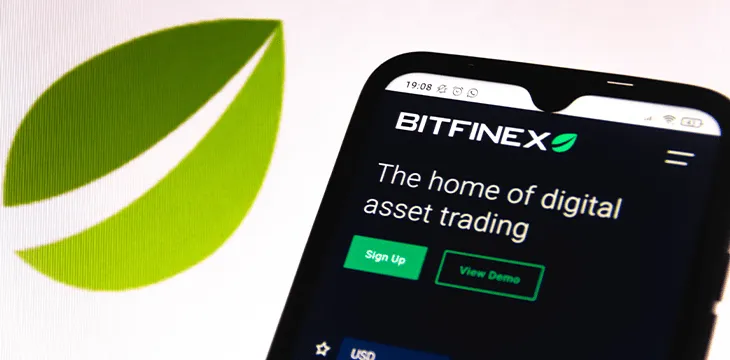|
Getting your Trinity Audio player ready...
|
The integrity-challenged parent company of dodgy cryptocurrency exchange Bitfinex has been sued by a man who accuses the exchange of failing to safeguard hundreds of thousands of dollars’ worth of stolen EOS tokens.
Late last month, Ephraim Atwal, a doctor residing in New York state, filed a civil complaint in U.S. federal court accusing iFinex Inc., BFXNA Inc. and BFXWW Inc. of failing to halt the theft of some 158,000 EOS tokens, worth around $670,000 at the time they were stolen.
The tokens were part of a much larger cache of nearly 2.1 million EOS that were stolen from Atwal’s account between late-February and early-March 2019. Atwal’s complaint states that his private keys were “obtained by a third party through a fraudulent application” sometime in late-August/early-September 2018.
On September 25, 2018, Atwal filed a claim with the EOS Core Arbitration Forum (ECAF) seeking an emergency freeze of his account. An ECAF arbitrator issued an emergency order for the EOS blockchain to restrict any transfers from the compromised account while Atwal’s ECAF claim was pending. But an unauthorized party, which had by then changed the private keys, proceeded to transfer tokens from the account, with 158,000 EOS moved to “one or more accounts” on Bitfinex.
On March 25, 2019, an ECAF ruling publicly declared Atwal to be the “true owner” of the account and that transfers from the account were “unauthorized.” Digital currency exchanges were told to treat the ruling “as proof of ownership and return any [EOS] funds originating [from the account].” The ruling added that “[a]s members of the EOS ecosystem, exchanges are also bound by the [EOS] constitution and should respect the validity of this ruling.”
On February 22, 2019, pursuant to the Bitfinex website’s instructions, Atwal submitted a ticket demanding the freezing of his stolen EOS. Atwal received a reply stating that the EOS had been frozen but ‘law enforcement involvement was required’ to maintain this freeze. Atwal claims iFinex offered no guidance as to how long its initial freeze would last but he nonetheless got the Federal Bureau of Investigation (FBI) to instruct Bitfinex to freeze the EOS and return it to Atwal.
However, due to “Bitfinex’s internal staffing issues and/or [iFinex’s] failure to comply with its internal policies or procedures,” Atwal claims iFinex “did not timely respond to or take appropriate measures in response to the FBI’s requests” and the stolen EOS was transferred out of the Bitfinex account. To date, none of the stolen EOS that passed through Bitfinex has been returned to Atwal.
Atwal’s attorneys have accused iFinex of unlawful conversion, trespass to chattels, breach of contract, unjust enrichment, negligence and engaging in deceptive acts and practices in violation of New York General Business Law (GBL). Atwal is seeking damages of at least $670,000 on five of the claims, while seeking treble damages and reasonable attorneys’ fees on the GBL violation, along with other relief the Court may deem just and proper.
Under normal circumstances, Atwal’s chances of getting justice from iFinex would be akin to squeezing blood from a stone. Simply put, iFinex—which also counts the controversially unbacked Tether stablecoin amongst its holdings—treats regulatory orders much like Vladimir Putin treats United Nations resolutions, i.e., something that can be ignored without much in the way of blowback on one’s unlawful operations.
However, the fact that Atwal is a New York resident could help tilt the balance in his favor. iFinex is currently keen to get its grubby little hands on the 94,000 BTC tokens seized last month by the U.S. Department of Justice. The massive haul of BTC, worth several billion dollars, was part of nearly 120,000 BTC stolen during the 2016 hack of the problem-plagued Bitfinex. The New York branch of U.S. Homeland Security Investigations provided assistance in the investigation that led to February’s mega-seizure.
While Atwal’s woes appear to have started after falling victim to a phishing attack, one could argue that his troubles began when he invested in EOS, a technology co-founded by Brock Pierce, who also co-founded Tether. Simply put, there seems to be little profit for anyone who gets involved—six degrees of separation notwithstanding—with the Crypto Crime Cartel’s Kevin Bacon.
Block.one, the Pierce-founded developer of EOS, has come under heavy fire for the token’s controversial 12-month initial coin offering (ICO), which resulted in a $24m civil penalty issued in 2019 by the U.S. Securities and Exchange Commission for running an unregistered securities offering. Last September, evidence of extensive wash trading of EOS during the ICO added more tarnish to the token’s former luster.
Follow CoinGeek’s Crypto Crime Cartel series, which delves into the stream of groups—a from BitMEX to Binance, Bitcoin.com, Blockstream, ShapeShift, Coinbase, Ripple, Ethereum, FTX and Tether—who have co-opted the digital asset revolution and turned the industry into a minefield for naïve (and even experienced) players in the market.

 07-15-2025
07-15-2025 





